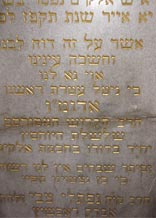Reflections
‘The sharp one of the Jews’
Rav Naftoli Tzvi Horovitz of Ropshitz merited the title ‘the sharp one of the Jews’ due to his exceptional wisdom and the sharpness of his mind. All his words were carefully measured and calculated, concealing within them kernels of wisdom that few were able to adequately perceive and appreciate.
In his youth, Rav Naftoli learned Torah from his uncle, Rav Meshulam Igra of Tisamenitz. He drew closer to chassidus as he matured, first making his way to the court of the Rebbe Rav Elimelech of Lizhensk. According to tradition, Rav Elimelech at first refused to accept him as a talmid, citing his misnagdishe yichus, but Rav Naftoli eventually found favour in his eyes, and also protested that he was not at fault in the matter of his family’s connections, and he was then accepted as a talmid. Rav Naftoli also sought to draw close to other great Rebbes, including the Maggid of Kozhnitz, the Chozeh of Lublin and Rav Menachem Mendel of Riminov.
It is related that when the French Napoleon was in the midst of his campaign to overrun Europe, Rav Menachem Mendel of Riminov endeavoured to make the war become that of Gog u’Magog, after which would come the Final Redemption. Rav Naftoli of Ropshitz opposed this plan, since it would involve great suffering for the Jews, and his tefillos fought against those of Rav Menachem Mendel, as he davened that Napoleon be vanquished. Rav Naftoli was successful and Napoleon was indeed defeated; Rav Menachem Mendel was therefore aggrieved at Rav Naftoli’s actions and said of him that he should be removed from the world. Rav Naftoli was greatly disturbed at this and sought to have the decree of Rav Menachem Mendel rescinded; to this end, he assembled the greatest of his students, intending to convince them that they should remove themselves from his leadership. He hoped that by leaving the chassidim without a leader, Moshiach would then come and the decree would be abolished. After Rav Naftoli had outlined his plan before the assembled chassidim, his friend Rav Tzvi Hirsh of Ziditchoiv arose and addressed them, saying; “what do you lack here?” (implying that they should refuse to lose such a leader). Thus Rav Tzvi Hirsh ruined Rav Naftoli’s plan, and Rav Naftoli was aggrieved at him for this, until he saw Rav Tzvi Hirsh davening the tefilla ‘shemone esrei’, upon which he said; “from the time that I saw the Rebbe Reb Elimelech daven, I never saw such a tefilla as this one”, and then he added that; “this Jew acts entirely for the sake of Heaven”. Rav Yechezkel Shraga Halberstam of Shineva, when recounting this tale, would add that Rav Tzvi Hirsh of Ziditchoiv did to Rav Naftoli exactly what Rav Naftoli had previously done to Rav Menachem Mendel of Riminov.
A few years after this had all taken place, Rav Tzvi Hirsh fell ill, and all the great chassidic leaders davened for his recovery. After he had indeed recovered and risen from his sickbed, Rav Tzvi Hirsh said that all the tefillos offered on his behalf had assisted his recovery, and the tefillos of three people had helped more than those of the others. Those three, he related, were Rav Avraham Yehoshua of Apta, Rav Naftoli of Ropshitz and Rav Moshe Teitelboim of Ujhely. Rav Tzvi Hirsh even travelled especially to Rav Naftoli to thank him for his tefillos.
After the petiras of his Rebbes, Rav Naftoli fixed his permanent abode in Ropshitz where he served as rav, and multitudes of chassidim streamed to him there, from all parts of Galitzia. Rav Naftoli had special customs particular to him, including certain niggunim with yichudim that he would sing, particularly at the seudos of Shabbos. Each niggun held within it deep and concealed secrets of yichudim.
Rav Naftoli was renowned for the sharpness of his mind and his great wit. His words contained many levels of hidden wisdom that only the greatest of his talmidim could fathom. Rav Naftoli instructed that on his matzeiva be engraved that he had always cloaked himself with simcha, melody, dance and jest.
A short time before his passing Rav Naftoli, who had always been known for his pointed words, ceased speaking. His talmidim and all those close to him were greatly pained at this, especially since he did not communicate any of his needs to those who desired to serve him. Eventually, his son Rav Avraham Chaim went into his father’s room and asked him why he had stopped talking, even though he still had the ability to speak. Rav Naftoli opened his holy mouth and answered; “my son, from the time that I was aware, I never uttered the slightest word without yichud; and now, my mind has lost its strength [to do so], and I said to myself – better to seal my mouth and not speak, rather than speak without yichudim.”
Rav Naftoli was recalled to the Heavenly Yeshiva on the twenty-sixth day of the Sefira, the eleventh of Iyar, in the year 5587, whilst he was in the city of Lantzot.
Rav Naftoli had many great students, the most prominent of them being Rav Chaim Halberstam of Tzanz, Rav Tzvi Elimelech Shapira of Dinov (the Bnei Yissachar) and Rav Tzvi Hirsh of Riminov.
Rav Naftoli’s words of Torah were printed in the seforim ‘Zera Kodesh’ and ‘Ayala Shelucha’; further Torah thoughts of his were collected in the seforim ‘Eser Tzachtzachos’, ‘Ohel Naftoli’ and ‘Imrei Shefer’.
The mantle of leadership of the Ropshitzer chassidus passed to his son-in-law Rav Osher Yeshaya Rubin, author of the sefer ‘Ohel Yesha’.






